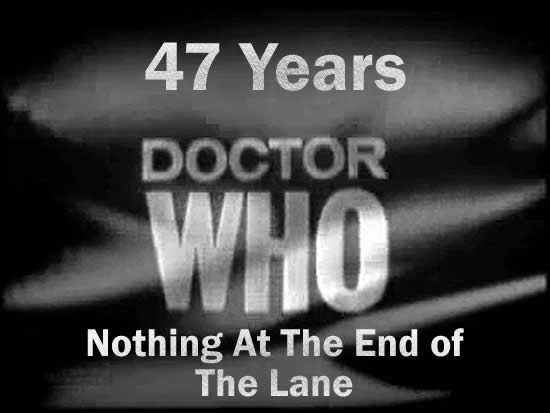
Sally Whelan knocked hesitantly at the lightly varnished wooden door. There was no name plate on it. There was a lighter rectangle where one had been, underneath the brass number that identified the room on the floor plan. But nobody had yet got around to putting the name of the newest incumbent on this office door.
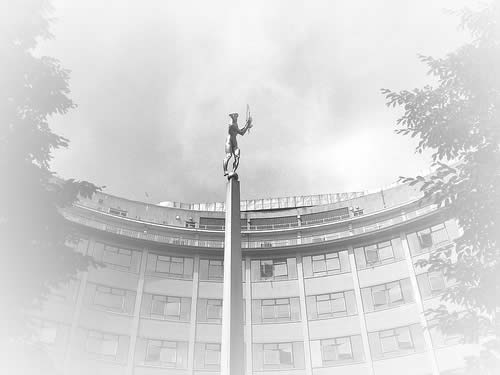
“Come in,” said a female voice. She turned the handle and stepped inside. She noticed straight away that the office was very tidy, with not much furniture other than two desks with chairs. The one filing cabinet was below a shelf crammed with box files. A piece of wall space was covered by a large blackboard where a complex schedule had been mapped out - a schedule for casting, rehearsal, recording and broadcasting of a television programme. Sally had seen many such schedules in the six months since she started work in the BBC typing pool. She had squinted at smaller versions on sheets of foolscap, handwritten, crossed out, annotated by another hand. She had typed up clean copies of them, wondering what it would be like to be involved in actually making those programmes.
The typing pool at Television Centre certainly wasn’t the glamorous job her friends thought it was. She had never more than glimpsed a famous face or two in the foyer as she arrived in the morning or clocked off at the end of her working day. Typing out internal memos from the Head of Drama (serials) to the Head of Drama (plays) was no more interesting than typing out internal memos in the typing pool at Ealing Borough Council, the first job she had done after secretarial school. She had stopped being excited when she typed the name of a well known television personality or the title of a programme that she heard people talking about on the bus.
Not that she was dissatisfied with her job. It was well paid. It was secure. The office was nice. The building was only three years old. It still felt new. Her desk was beside a window. When she paused in her work she liked to look out at the circular courtyard in the middle of the very modern design. She tried not to look at the golden statue on top of a slender pillar in the very centre of the courtyard. It was roughly level with the floor she worked on, and the fact that it was a well-muscled naked Greek god was all too obvious. Miss McIntyre, the supervisor, disapproved of the statue and threatened to have the blinds permanently drawn if young, impressionable girls didn’t stop looking at it. Sally didn’t want to look at it, but she did enjoy looking down at the fountain beneath the statue. On her lunch hour she always went down there and sat by the water to eat her sandwiches - except that one day when she hadn’t seen a film crew at work and had been shouted at for wandering into shot.
That was about the closest she had been to the glamour of television up to now.
There was a woman standing on a small step-ladder to put more box files on the very top shelf. She looked to be in her early thirties, which made her rather older than most of the secretaries Sally knew. Most of them got married and left the job before they were twenty-five. The exceptions were career women like Miss McIntyre. At a mere twenty years of age, Sally hadn’t decided whether she wanted to be a career woman or whether she would like to get married and have a house and family and a husband to look after.
“Hello,” she said as the woman descended the ladder and turned around. “I was sent to see a Mr Lambert... He needs a personal assistant, and Miss McIntyre said I was ready for more responsibility...”
“Mr Lambert?” The woman smiled grimly. “Did Miss McIntyre actually say MR Lambert?”
“No,” Sally replied. “She said I was to report to a V. Lambert. But...”
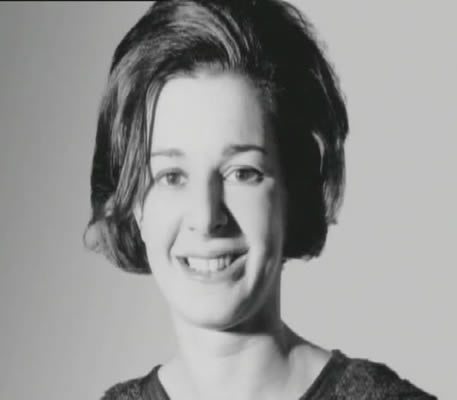 “Don’t
worry, it’s not your fault, or Miss McIntyre’s. The number
of female television producers in the world can be counted on one hand.
I’m Verity Lambert, and it looks as if you’re working for
me from now on.”
“Don’t
worry, it’s not your fault, or Miss McIntyre’s. The number
of female television producers in the world can be counted on one hand.
I’m Verity Lambert, and it looks as if you’re working for
me from now on.”
“I... didn’t know there were ANY female television producers,” Sally said after a few seconds during which the floor failed to open up and swallow her and her feet refused to turn and bolt back out of the door. She wasn’t sure whether bolting might still be a good idea.
“I’m sure there are those in high places who would prefer it that way,” Miss Lambert said caustically. “I sometimes wonder if that’s why I was given this programme to work on. If it fails they can blame me and shunt me back to commercial television where they can afford to experiment with radical notions. Except it isn’t going to fail. I am sure it’s going to be a great success. So welcome aboard, Sally. That will be your desk over there by the window. There’s no phone, yet. But it’s been ordered, along with my nameplate for the door. Meanwhile, come and look at what you’ve let yourself in for.”
Miss Verity Lambert moved towards the blackboard and studied the bewildering schedule for a few moments. It seemed to make sense to her. Sally tried to understand it, too. She noticed that there was a provisional first broadcast date in mid-November. For today, June 25th, there was a casting meeting in room 2119.
Quite the most frequently used word on the schedule was ‘Doctor’.
“It’s... about a doctor?” Sally queried. “But the BBC already makes Dr Finlay’s Casebook. Why would they want another drama like that?”
Miss Lambert smiled softly.
“Come along with me up to the casting session. I’ll explain all about it on the way.”
“You want me to come to something actually to do with making a television programme?” Sally was surprised. She had expected the personal assistant job to be more typing in a smaller office.
“Bring your shorthand pad. There will be notes to be taken,” her new boss said. “But, yes, you’re in the drama department now. Expect some of it to be exciting.”
That sounded promising. Sally made sure she had plenty of pencils and a fresh writing block and followed Miss Lambert along the gently curving corridor until they reached room 2119. It was a comfortable room lacking any desks but several soft chairs. There was a man already sitting in one of the chairs. He was young and quite good looking...
...For a coloured man.
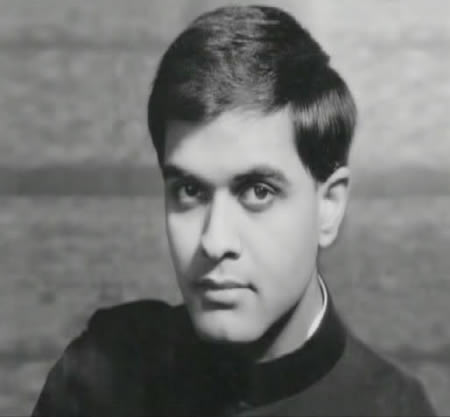
Sally didn’t know very many coloureds. There were some in the street where she lived. But she had no idea how to talk to them. Their accents were difficult to understand and she knew they shopped at different shops and ate very different sorts of food than she ate. Even those living in small flats seemed to have lots of children. She was an only child and didn’t know anyone with children.
“Sally, this is Mr Waris Hussein,” Miss Lambert said. “He’s the director of our new programme. Waris, this is Sally Whelan, my personal assistant. She’s spent most of her BBC career in the typing pool, so I am sure she is more than ready to see what the rest of us do for a living.”
“Pleased to meet you, Sally,” said Mr Hussein, holding out his hand politely. Sally reached out to shake. She noticed that he had a perfectly ordinary ‘BBC English’ accent.
She sat down beside the producer and director of the new television programme that she had heard all about on the way up to room 2119. It was a weekly serial called Doctor Who, but it had nothing to do with hospitals or medical matters.
The Doctor of the title was a man from another planet who had landed his space and time travelling machine on Earth and was living as an ordinary Human being.
Sally had never really taken a great interest in science fiction before. She remembered a lot of people being excited last year about The Quatermass Experiment, but she had just moved into her flat and she didn’t have a television. She had seen episodes of Flash Gordon at the cinema, and there were radio plays based on the works of HG Wells from time to time. But she had never really thought of it as something that she liked.
She wasn’t sure she would like this Doctor Who programme. But whether she liked it or not wasn’t really important. She was just there to make notes as Miss Lambert and Mr Hussein auditioned young women for one of the important parts in the programme.
The young women were all about her own age, Sally noticed. Some of them she thought she recognised. They were actresses from television. In one afternoon, the number of famous people she had seen in her job at the BBC had tripled. That was excitement in itself.
“No, none of them are right,” Mr Hussein said. “They’re all too ordinary looking.”
“Really?” Sally said before she realised she was talking out of turn. “I thought they were all very pretty.”
“Pretty is easy,” Miss Lambert said, not seeming to mind that she had said such a thing. “We need more than that. Susan is the same alien species as The Doctor. She was born on another planet. She has to stand out from every other fifteen year old girl in her school.”
“We’ll find her,” Mr Hussein said, confidently. “We have time. It doesn’t all have to happen in one day.”
“Would you see about some tea, Sally,” Miss Lambert asked her. “Before we start looking at the actresses for the role of Miss McGovern.”
Sally put down her notes and went to do as she asked. In the typing pool she didn’t have to fetch tea. That was brought round on a trolley by a lady in a pinny. But she didn’t mind doing what seemed like a menial task. She was doing it for the producer and director of a brand new television programme, who wanted to find an actress who looked like she came from another planet. This was turning out to be a very interesting day, after all.
She stepped back into Room 2119 carrying a tray of tea with sugar, cream and a plate of biscuits. Miss Lambert and Mr Hussein were sitting back and looking at a television screen that was showing not a finished television programme but what was being filmed right at that moment in one of the studios several floors below these administration offices. Sally looked at the screen with interest. She KNEW there were television studios at Television Centre, but she had not had anything to do with them up in the typing pool. This was the closest she had been to seeing programmes being made.
As Miss Lambert and Mr Hussein started auditioning women for the role of a school teacher who becomes suspicious that Susan is not what she seems to be, Sally watched the screen. She soon came to the conclusion that making a television programme involved an awful lot of standing around doing nothing. The camera through which she was seeing the images spent most of the time focussed on the actors and actresses huddled together chatting while waiting to be filmed.
She took her eyes off the screen to take down some notes about the actress who was being auditioned. Miss Lambert was dissatisfied with her. She didn’t quite have the qualities they were looking for. Sally wondered if it was always this hard to find actresses for programmes. When she watched anything on television it always seemed as if they had the right person for each part.
Both the actresses who were auditioning for the character called Miss McGovern were quite famous. Sally had seen them on television programmes. But neither of them were what Miss Lambert and Mr Hussein wanted.
Sally brought more tea without having to be asked. The producer and director were looking desperate by now. It was the least she could do for them. They drank the tea while watching what was still going on down in the studio.
“Wait!” Mr Hussein sat forward suddenly. He was watching the screen carefully. Sally wondered why until he directed Miss Lambert’s attention to one of the actresses on the screen.
“I don’t know who she is,” Miss Lambert said. “But she’s EXACTLY what we’re looking for.”
Sally looked at the young woman they were both interested in. She had dark hair and eyes and a pale complexion, though that might have been the make up she was wearing for the filming. Her face had a delicate elfin shape that was strikingly unusual as well as very pretty.
It was possible, with a little imagination, to think that she was born on another world.
“Sally,” said Miss Lambert. “Would you please run down to studio three and ask if that young lady could come up here for a short interview.”
“Me... go down to the studio?”
“Yes, please,” Miss Lambert said.
She didn’t exactly run. It was a long way down to the studio floor and she would be out of breath. But she did do something she had never done when she worked in the typing pool on the top floor. She summoned one of the lifts. As a mere typist, she would have felt hardly important enough to ask the dignified man in a neat uniform and cap with ‘BBC’ in silver letters on it to convey her to the third floor. She had always taken the stairs.
But this time she was on an errand for Miss Lambert. The first time she said “Ground floor, please,” to the lift man, her voice was a mere squeak. She tried again, hoping she sounded like somebody who was connected with the important work of actually making programmes.
At the door to the studio her courage almost failed her again. She checked that the red ‘on air’ light wasn’t on. That was the worst faux pas anyone could commit in BBC Television Centre. Then she took a deep breath and stepped inside.
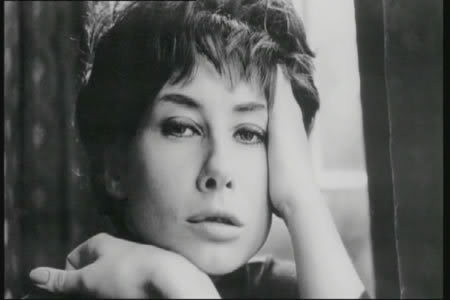 Half
an hour later, when the director of the programme being made in that studio
finally called ‘cut’ and ‘wrap’ and told the group
of actresses that they were done for the day, she returned to the second
floor, this time escorting a girl who was just about her own age, but
far more used to travelling in lifts. Sally brought her to Room 2119 and
introduced her to Miss Lambert and Mr Hussein and then sat down to make
notes while Carole Ann Ford auditioned for the part of ‘Susan’,
a girl from the same planet as the mysterious time and space travelling
Doctor. She was a little surprised when, in addition to reading a page
of the, as yet, unfinished script, Carole Ann was asked to scream. She
did so. Sally thought it a good thing the typing pool was another floor
away. That would have been even more distracting than naked Helios shining
in the summer sun.
Half
an hour later, when the director of the programme being made in that studio
finally called ‘cut’ and ‘wrap’ and told the group
of actresses that they were done for the day, she returned to the second
floor, this time escorting a girl who was just about her own age, but
far more used to travelling in lifts. Sally brought her to Room 2119 and
introduced her to Miss Lambert and Mr Hussein and then sat down to make
notes while Carole Ann Ford auditioned for the part of ‘Susan’,
a girl from the same planet as the mysterious time and space travelling
Doctor. She was a little surprised when, in addition to reading a page
of the, as yet, unfinished script, Carole Ann was asked to scream. She
did so. Sally thought it a good thing the typing pool was another floor
away. That would have been even more distracting than naked Helios shining
in the summer sun.
But when Miss Lambert and Mr Hussein talked quietly to each other using words like ‘yes, just what we wanted’ and ‘excellent’, she felt a burst of pride at having played a very small part in casting one of the most important roles in the programme in which she was starting to feel a real involvement.
By the end of the week, the problem of who would play Miss McGovern was solved when Miss Lambert called an old friend of hers who was, she said, a marvellous actress, and found she was free to come in and do a read through. When Sally clocked off at the end of Friday, she was feeling very satisfied with her new job. It might not pay very much more than the typing pool, but now she felt she had more than just the letters at the top of her wage slip to prove that she worked for the British Broadcasting Corporation.
On Monday morning, though, she was feeling a little bit worried. Her days as a personal assistant to Miss Lambert might be numbered. When her boss found out what she had done, it was unlikely that she would be sent back to the typing pool. She would far more likely be sent to the clerks office to collect her cards.
“Sally,” Miss Lambert said just before the lunch hour. “What’s the matter, today? Did you have a bad weekend?”
“No,” Sally answered. “I had a very nice weekend. I met up with some of the girls I went to school with. We had tea and chatted for ages... and....”
Sally burst into tears. Miss Lambert looked at her curiously and then passed her a box of paper tissues. After going through half a dozen of them she was ready for the confession that would surely put an end to her job.
“I told them I was working for the BBC. And... some of them were excited and asked if I had met any big stars. But some of them... no... one of them... Gladys Anderson... she’s a properly trained legal secretary working for a firm of lawyers in the City. She wears really lovely skirt suits to work... and she said I was just in the typing pool and it didn’t matter where I was doing that. Typing was typing. Which is true, of course. It is. But I told her I’d been promoted. I said I was personal assistant to a producer and helping to make a new programme. And, of course, they wanted to know what the programme was. So I told them everything. About the Doctor and Susan and the space and time ship and coming from another planet and....”
Sally hiccupped and blew her nose before going on.
“And Gladys looked really put out, because everyone else was really impressed that I was doing something so exciting. And I told them lots more about the auditions and all the actresses they had heard of who we... I mean... you... turned down. I kept saying ‘we’ as if I actually did have something to do with it. I made it sound as if I was much more involved than I really am. But I just wanted Gladys to be REALLY put out.”
Miss Lambert said nothing. Her expression was impossible to gauge. Was she really angry or just disappointed?
“But... you see... later, when I was home, I realised... I’m sorry, Miss Lambert. I know I shouldn’t.... I shouldn’t have talked about it at all. I certainly shouldn’t have said as much as I did about what the programme was about, the names of characters and the actors and actresses... I broke so many confidences...”
“No you didn’t,” Miss Lambert answered her.
“I didn’t?”
“Nothing you did since you joined me last week was in confidence, except the memo you typed up for Mr Newman about the per-episode cost. We never talk about accounts outside of the office. But there’s nothing wrong with telling your friends about our programme.”
“But Miss McIntyre used to insist that we NEVER talked about anything that came onto our desks,” Sally told her. “I thought....”
“It’s quite all right,” Miss Lambert insisted. “The typing pool has to have rules. But you’re not in the pool now. As for Gladys... I’ve got a school friend exactly like that. She thinks I make tea for Sydney Newman. I can’t wait until November when she sees my name in the Radio Times next to ‘producer’.”
Sally managed a half smile at that, and the terrible ache in her stomach eased a little. She was about to say something else when the office door opened. Her mouth went dry as she hurriedly swept the used tissues from her desk into the waste bin.
“Sydney!” Miss Lambert said. “I wasn’t expecting you to come down to my humble office.”
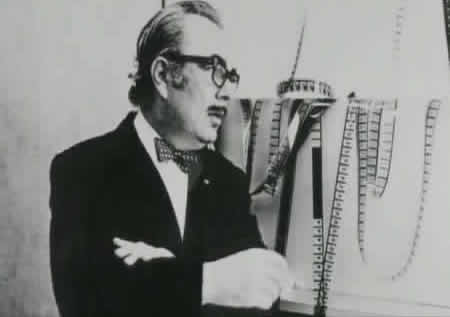
“I didn’t expect you to be making your secretary cry, Verity,” Mr Sydney Newman, Head of Drama, said in his brusque Canadian tone. Sally was astonished that he had noticed her, let alone that she had just stopped crying. Then she was mortified as Miss Lambert explained the reason for her tears.
Sydney Newman laughed. Again there was a brusqueness to the laugh, but at the same time it wasn’t unkind, and Sally’s reaction was astonishment again when he spoke directly to her.
“What did your friends think? Apart from this Gladys one. I’ve got friends like that, too. Don’t pay any attention.”
“Think?” Sally managed to say.
“About our programme. What did they think about the idea?”
“They... weren’t quite sure,” Sally admitted. “Science fiction…. I’m afraid most of the girls didn’t think it was something they would watch. They thought it would be all right for boys, and maybe their fathers. But not for girls and the mothers. Jennifer Gill... she sat next to me in home economics… she’s leaving her job next month to get married...” Miss Lambert’s eyes narrowed at that. Sally wondered if she was talking too much, but Mr Newman smiled encouragingly and told her to go on. “Jennifer said she would rather watch something about real life. Something like....”
She paused and looked at the BBC heading on the sheet of notepaper in her typewriter in front of her.
“She said she preferred to watch Coronation Street,” Sally admitted in a near whisper.
Sydney Newman laughed out loud.
“Yes, I know, it’s practically blasphemy to say that within these hallowed walls,” he told her. “Between you and me, I don’t mind Coronation Street one little bit. I wish I’d thought of it. A programme that appeals to the ordinary people. And there’s a fellow Torontean behind it, Harry Elton. Clever man, good instincts for what the people want to see on their televisions. It’s fine by me. Besides, Doctor Who is going out on a Saturday evening. Your friend can watch both if she wants. You tell her that from me.”
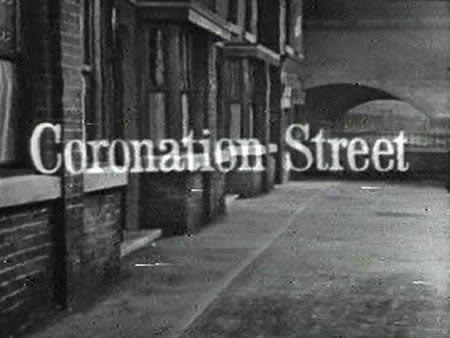
“I... will,” Sally answered. She looked at her typewriter again and then dared to say something else.
“Doctor Who is meant to be for children and their parents to watch...” she said. “Well, Dora Carr said it sounded a bit funny... the idea of Susan, a girl of only fifteen, being with The Doctor who was hundreds of years old.”
“Funny?” Sydney Newman grimaced and looked at Miss Lambert for a moment. “As in... she thinks it’s not quite moral?”
“I explained that they come from another planet and that things might be different there, and she said ‘not THAT different.’ And... actually, I was thinking about it after, and she might be right. I mean... I don’t think there IS anything wrong with the idea. But people might THINK there is... if... if that makes any sense?”
“It makes perfect sense,” Miss Lambert said. “If people get the wrong idea about the characters.... Not that I think we should be dictated to by other people’s moral values. But we don’t want letters of complaint, after all.”
“It... might be all right if....” Sally went on, then stopped. Again, Mr Newman seemed encouraging. “Well, I thought about it... and... what if she was related to him in some way. What if she was his niece or granddaughter or something, and he was her guardian because something happened to her parents? That would be all right.”
“It’s more than all right,” Miss Lambert said. “It’s the very thing we need. Of course, both of them must seem different from ordinary Humans. But an ordinary Human kind of relationship between them... at the same time, they have something that viewers will identify with. Family ties.”
“Excellent,” Sydney Newman said. “Talk to Whittaker about it. Sally, you keep on thinking about things like that. And if your friends have any more to say about our programme, well, you just tell them to watch out for it. Anyone who switches to ITV on a Saturday this autumn is going to be the odd man out.”
With that, he wished Sally and Miss Lambert a good day and swept out of the office.
“He didn’t even say what he came in for,” Sally noted.
“I think he might have got what he wanted,” Miss Lambert told her. “Type a new memo for me, please. To David Whittaker, Script Editor, Doctor Who. Changes to Susan’s character. She is The Doctor’s granddaughter. Their relationship should be... affectionate, but perhaps occasionally fractious. The huge age gap will tell. Susan.... let me see... she goes to an ordinary school... trying to fit in as a Human, but sometimes making mistakes that give her away as different. The Doctor himself, aloof, avoiding Human contact...”
For a few moments, Sally had been too pre-occupied with her own thoughts to realise she was meant to be taking this down. Then she grabbed her pencil and hastily wrote down the shorthand notes before typing up the memo and reaching for the phone to summon a messenger boy to take it to Mr Whittaker’s office. He, in turn, would contact the people who were actually writing the scripts for the series and they would include those ideas.
All of that was set in motion because she had talked to her friends on Sunday afternoon about the programme she was helping to make.
Sally didn’t see her friends that weekend, or the weekend after. She spent her spare time quietly. She was working so hard during the week, and it was exciting work, most of it. After a week in the typing pool, she wanted variety on her time off. She had wanted to talk to people who were doing more interesting things. But now she was happy to go for a walk in the park, eat a sandwich and feed the crumbs to the ducks, and come home to watch a little bit of television.
Juke Box Jury on a Saturday night was a programme she enjoyed. She quite liked pop music and it was a good way to find out what was new. She had never really thought about what came on before it. Nothing did, really. After Grandstand and the news and weather, there was a gap in the schedule with music or short documentaries, nothing very special. Eight years after ITV began it was a gap the BBC couldn’t afford to have.
Their new programme, Doctor Who, was going to fill that gap, keep the families sitting by the fireside with the television on watching the BBC instead of reaching to turn over.
Sally had never really thought about it as a battle before. She never thought that she was on one side of a war. But she was. The grand old BBC was fighting against the new upstart commercial stations for viewer loyalty. She worked for the BBC. She had taken their side.
She wanted them to win.
She stopped watching ITV, even Coronation Street, despite its having Mr Newman’s endorsement.
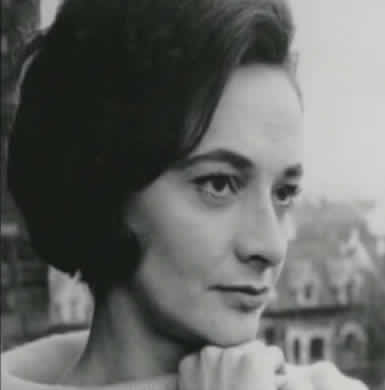 The
weeks went by and she typed up memo after memo, report after report about
the progress of Doctor Who toward filling that important gap in the Saturday
night schedule. She typed the final list of characters, noting that Susan
now had a surname, Foreman, that Miss McGovern was now called Barbara
Wright, played by Miss Lambert’s friend, Jacqueline Hill, and she
was accompanied by a handsome young male teacher called Ian Chesterton.
Sally looked at a glossy photograph of him that had been pinned to the
wall and wondered if her friend, Jennifer, would think he was better looking
than Ken Barlow from Coronation Street.
The
weeks went by and she typed up memo after memo, report after report about
the progress of Doctor Who toward filling that important gap in the Saturday
night schedule. She typed the final list of characters, noting that Susan
now had a surname, Foreman, that Miss McGovern was now called Barbara
Wright, played by Miss Lambert’s friend, Jacqueline Hill, and she
was accompanied by a handsome young male teacher called Ian Chesterton.
Sally looked at a glossy photograph of him that had been pinned to the
wall and wondered if her friend, Jennifer, would think he was better looking
than Ken Barlow from Coronation Street.
Sally thought he was, though perhaps she was biased.
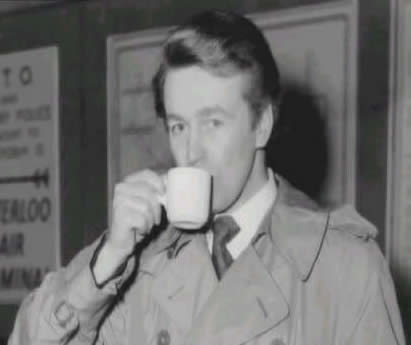
The Doctor had been cast, too. She looked at the photograph of William Hartnell, the most famous of all the actors and actresses involved. He had been in so many films that Sally had seen at the cinema, she had felt quite nervous when she took notes at the interview with him. Miss Lambert had been nervous, too. She admitted, later, when the contract was sealed, that she had been desperate to get him. They needed an actor of quality and character, and Bill, as Miss Lambert called him, was exactly that.
Sally wondered if she could ever call a famous man like that ‘Bill’.
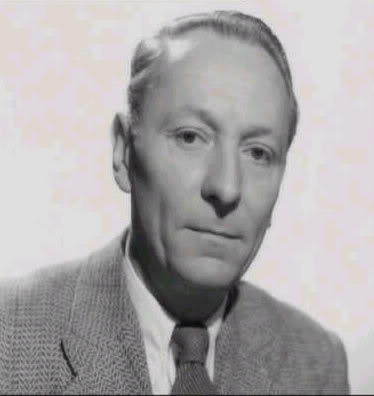
As a warm August rolled on, marked by that thoroughly audacious train robbery that shook the nation, and the subsequent failure of the police to find the money or the robbers, Doctor Who slowly became a reality.
Every now and again, though, they ran against problems that threatened to put a stop to the reality as surely as the robbers had stopped the mail train. Sally was aware of what the problems were. After all, she typed the memos.
“Five hundred pounds?” she queried, peering at the handwritten list of expenses for Doctor Who. “Is that right? It seems an awful lot of money. What’s it for?”
It wasn’t really her job to ask that last question, but she couldn’t help herself. Miss Lambert paused in her own work and came to look at the list.
“Yes, that’s right,” she said. “That’s the portion of the series budget set aside for building the interior of the Doctor’s space ship.”
“Five hundred pounds?” Sally felt a bit silly repeating herself. “Is that really what a set costs? I never imagined they were so expensive. I’ve never seen five hundred pounds in one place.”
“Neither have I,” Miss Lambert admitted. “It’s a little bit extravagant, I must admit. But The Doctor’s space ship is a completely new idea. It isn’t Ken Barlow’s living room with bits of old furniture and ornaments dug out of the props room. It’s all got to be made from the ground up. And it has to look amazing, like something from the future, from another world, something nobody has ever seen before.”
Sally tried to imagine what it might look like. Her imagination failed her. She had no idea what the inside of a space ship ought to look like.
“Miss Spicer isn’t happy about the cost,” Miss Lambert added. “I had a VERY difficult conversation with her about it. She insisted it was too expensive.”
“So it won’t happen?” Sally looked worried. She was trying to stretch her imagination to encompass something nobody had ever seen before and now it seemed as if the accounts department were going to say no.
“Oh, of course it will,” Miss Lambert assured her. “What Miss Spicer didn’t realise was that the space ship will be seen in almost every one of forty-eight half hour episodes. It isn’t just a one-off extravagance. The five hundred pounds will be amortised over those forty-eight weeks. Once she understood that, it was all right. We’ve got a budget of two thousand, five hundred pounds for each episode.” Sally looked even more astonished. If five hundred pounds was impossible to imagine, two thousand five hundred was even more difficult. “It’s not as much as you think. Everything has to be paid for, from the electricity used to power the studio lights to the tea the camera men drink between takes, to hiring the rehearsal rooms, taxis for essential cast members. Somewhere in there, my salary and yours are included, too. So, really, it’s not very much, despite the cries of ‘too expensive for a children’s serial’ ringing around the building.”
Sally was relieved, not because her own wages were included in the budget Miss Lambert had secured, but because she really wanted to see Doctor Who made into a television programme, and any obstacle in the way of that was a source of anxiety.
Those obstacles were overcome one by one as autumn set in. One Tuesday morning, Sally accompanied Miss Lambert to a dingy but serviceable hall in Acton where the first episode was being rehearsed. A few days after that they went to Lime Grove where the sets that had cost so much to make were ready and waiting.
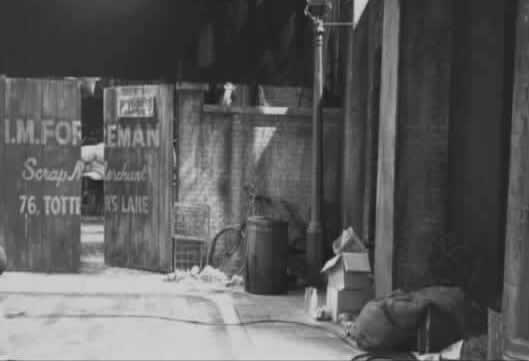
“I’ve typed so many memos about it,” Sally said as she looked in wonder at the replica of a junkyard with an old police box in the corner. She walked around the set admiring it. It was mostly flats and old bits and pieces from the prop room, but it felt real at last after being just words on a sheet of paper for so long.
The three sides of flats and the desks and chairs that made up the classroom felt real enough to make Sally nostalgic for her school days. But the pride and joy was the space ship itself, which she had learnt in the past few weeks to call the TARDIS, an acronym for Time and Relative Dimensions in Space.
She actually stepped ‘aboard’. The word came into her head as she walked around the alien ship’s controls on a wide hexagonal desk made to look like metal, but actually constructed of wood. It had lights that looked as if they might actually light up and dials that could turn. In the middle was a glass tube that was supposed to be the drive shaft of the ship or something like that. The flats that made up the walls on three sides were white inset with roundels. It really did look like an alien, futuristic space ship. It really did look like something nobody had ever seen before.
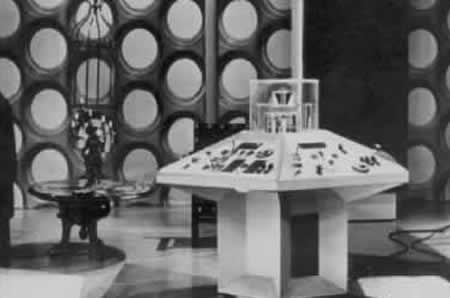
“And it’s all meant to fit inside that police box in the junk yard!” Sally laughed at the absurdity of it. “Oh, I hope people like that idea. It is just so wonderful.”
“I think so, too,” Mr Hussein told her. “But don’t talk about the police box around this studio! The trouble we had with it. First they were late sending it over. Then it wouldn’t fit in the lift in one piece. This recording is two days late because of it.”
“Sydney isn’t at all happy about that,” Miss Lambert added. “I really hope nothing else goes wrong, today. He might just cancel the programme altogether.”
“He wouldn’t, would he?” Sally asked. Again she felt anxiety for the project that had come to mean so much to her.
“Let’s hope not,” Miss Lambert said. “Come on, Sally. You can watch from the production booth with me. You’ve typed so many memos leading up to this. I think you deserve to see it actually happening.”
Sally was overjoyed as she followed the producer to the mysterious room beside the studio. She tried to make herself as unobtrusive as possible to the people with important jobs to do, but she took it all in. She looked at all of the camera monitors at once while listening to the director instructing the floor manager through a microphone to make sure all of the actors were on their mark before he called ‘action’.
Nearly an hour later, the first twenty-three minute episode was recorded. There were some problems. Some of the lines were fluffed through nervousness and the doors into the TARDIS didn’t close smoothly when they were supposed to. But to Sally, at least, it looked like magic being made. She was entranced.
“I can’t wait for it to go onto the television,” she said. “I think its going to be bigger than Coronation Street.”
That evening when she went home to her flat she was excited. The next day, though, when she got to her desk, Miss Lambert wasn’t there. She came in nearly an hour later looking hot and upset. Sally was surprised. She had seen her boss nervous and agitated, but not like this.
“Sydney didn’t like it,” she said very simply.
“Sydney... didn’t like what?” Sally asked, not quite understanding at first.
“An Unearthly Child. The episode. He looked at it last night and he didn’t like it.” Miss Lambert put an assorted collection of handwritten notes on Sally’s desk. She had seen Sydney Newman’s short-and-to-the-point style often enough by now to recognise it at once. “Make some kind of memo out of that, please. I need to talk to Waris and David. I don’t know what’s going to happen, now. It might all be for nothing.”

Sally actually had to bite back tears as she sat at her desk in an empty office and began typing up comments such as ‘What does she draw’, ‘bad profile of girl’ or ‘old man not funny enough’, ‘They don’t act as if he’s locked her in box’. Referring to a script she put the scene numbers beside each comment. It seemed as if there was hardly a minute of the episode that the Head of Drama didn’t criticise. For a while as she typed she hated Sydney Newman. He had destroyed the dream with his collection of caustic notes. Then she realised that was silly. This WAS just a television programme a children’s television programme at that. Besides, programmes must get made and cancelled all the time at the BBC and on ITV.

It wasn’t the end of the world.
But it felt like it. It really did.
Then Miss Lambert came back into the office. She was smiling. Sally’s heart dared to leap.
“He’s not happy at all,” Miss Lambert said. “But he’s not giving up on Doctor Who. He’s going to let us re-record the episode taking in the changes he suggests.”
“It’s... a good job I’ve finished typing up the notes then,” Sally answered.
It was mid-October and cold when they went to Lime Grove again. Sally watched the camera monitors carefully and noticed the subtle changes that by themselves were meaningless but together made each scene more polished and complete. She found herself admiring Sydney Newman for seeing how something she thought was fine the way it was could be improved. That, she supposed, was why he was the Head of Drama and she was a personal assistant to the producer.
“Sally,” Miss Lambert said when they were done. “I know you should be finished, now. But come back to Television Centre with me. There’s something I think you’d like to see as much as I do, after all the memos you typed about them.”
She didn’t say anything else, but Miss Verity Lambert, television producer, a smart woman who worked alongside men who thought she ought to make tea and were surprised when she didn’t, was nearly as giddy as a school girl. She took her personal assistant to the staff car park at the side of Television Centre where something surprising was happening.
“Oh,” Sally cried. “It’s... it’s the... the Daleks. For the second story.”
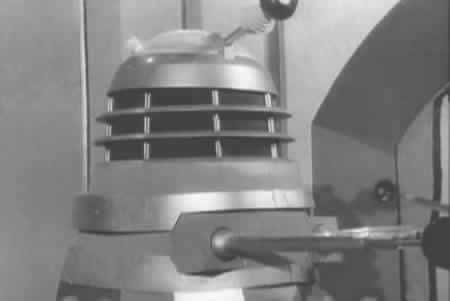
There were four of them. Two had no tops on and men were inside moving them about just like children with pedal cars. Two were complete and though she knew those also had men inside, it was possible to believe they were really alien creatures running around the BBC staff car park. They were like huge pepper pots with eye stalks and lights that looked a little like ears, and two mismatched limbs – one with a plunger on the end and the other just made of metal.
“I almost wish I could have a go,” Sally said. “But... that wouldn’t be very ladylike, I suppose.” She turned her eyes away from the Daleks and looked up at Television Centre. She couldn’t see the typing pool where she used to work. It was on the other side of the inner circle. She couldn’t help thinking how far away she was from that job, now.
At least she was for now. She knew that her days in this exciting world of television programme making could be numbered. Although the original idea had been to make forty-eight half hour episodes, that figure had been cut down to thirteen, because nobody was sure if Doctor Who would hold the audience’s attention.
So when it was over, she would probably be sent back to the typing pool. That was a depressing thought, but, after all, nobody ever said it was forever. She had enjoyed this summer and autumn working for Miss Lambert, taking a real part in the making of a television programme instead of just typing memos. If it came to an end she would have good memories to take with her.
The work began to fall into a routine. After the re-record of the first episode was accepted the follow up stories had to be rehearsed and recorded. When she wasn’t needed for more mundane tasks, Sally tried to spend as much time as she could in the rehearsal room or the recording studio. She wanted to see as much of it as she could. She wanted as many good memories as she could collect for those dull afternoons when she was trying not to look at naked Helios on his pillar.
Friday, November 22nd was the last day that Miss Lambert would need a personal assistant. All the way up to two-thirty, Sally was sure she would be going back to the typing pool on Monday.
Then Miss Lambert took a phone call. When she was done she was smiling.
“It’s been confirmed. Doctor Who has been commissioned for another thirteen weeks. Twenty-six in total.... half a year.”
“Oh,” Sally was pleased, but she didn’t know whether that was good news for her, yet. “Then... will you... do I....”
“Well, of course I shall need a personal assistant, still,” Miss Lambert said. “And I certainly don’t have time to train a new girl. So unless you want to run off and get married in the next thirteen weeks....”
“I don’t think that’s likely to happen,” Sally replied. “And I want to stay right here.”
“Well, no need to stay here right now. Go and pick up your wage packet from accounts and take yourself home for a well earned rest. You’ll be watching tomorrow, won’t you?”
“Nothing in the world could stop me,” Sally answered. “Goodnight, Miss Lambert. And... good luck. For tomorrow night.”
“Goodnight, Sally,” Miss Lambert said. “And thank you. By the way, on Monday, please, call me Verity, at least when there are no head of department people around. I think you’ve spent enough time in this office for that.”
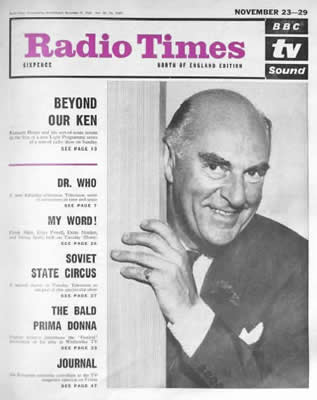 Sally
murmured something in reply, but couldn’t quite find the right words.
She was almost delirious as she walked down to the accounts office and
signed for her wages, then carried on downstairs. She clocked off and
walked out of the building. She looked towards the car park where the
Daleks had first come to life and then walked out through the gate. She
caught a bus at the end of Wood Lane. It was raining and already getting
dark by the time she got home. She warmed a bowl of soup for her evening
meal, made a cup of tea and put the radio on to listen to while she ate.
Sally
murmured something in reply, but couldn’t quite find the right words.
She was almost delirious as she walked down to the accounts office and
signed for her wages, then carried on downstairs. She clocked off and
walked out of the building. She looked towards the car park where the
Daleks had first come to life and then walked out through the gate. She
caught a bus at the end of Wood Lane. It was raining and already getting
dark by the time she got home. She warmed a bowl of soup for her evening
meal, made a cup of tea and put the radio on to listen to while she ate.
After she had eaten she sat on her sofa listening to the Light Programme on the wireless and looking through the Radio Times. Doctor Who was mentioned on the front page, and there was a nice picture and a short article about it inside. Verity’s name was there. Her friend who thought she just made tea would be green with envy. Sally wished her name was there, too. But she was just a typist, after all.
At six-thirty on this Friday afternoon, the music programme she was listening to was interrupted by a news flash. She was a little sleepy, but she sat up to listen, wondering what had happened. Was it something to do with the government? Had they caught the train robbers?
“This is the BBC Home Service. It is with deep regret that we announce that President Kennedy is dead. He was shot down as he was driving in an open car through the city of Dallas, Texas....”
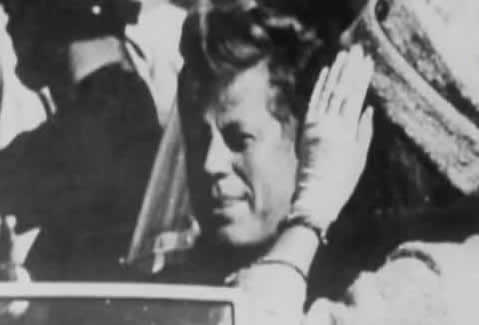
Sally reeled in shock as she listened to the details of the news from America. She cried in sympathy with the pretty young wife of the President who had been in the car with him when it happened. She grieved as so many did for the death of a good man who tried to do his best for his country and for the world.
Then something else occurred to her. Perhaps it was a selfish thought. She chided herself for it. But it lodged in her mind and it wouldn’t go away.
Would this mean Doctor Who wouldn’t be on television tomorrow?
She wanted to ask somebody. She thought about going down to the telephone box on the corner of the street and calling Miss Lambert – Verity. She had her home number written down in case of emergencies, and this, surely, was an emergency.
But it was dark outside now, and it was raining. Besides, Verity would surely be calling other people right now. It was far more important for her to know than her personal assistant.
Sally slept badly that night. She was upset by the news and she was nervous for tomorrow, even more so now that there was this doubt in her mind. Surely the day after the president of the USA had been killed was not the day to broadcast a children’s television drama about a time travelling old man and his granddaughter.
The thought stayed in her mind all day. It was still raining but she was too restless to stay in the flat. She walked in the park for a while. She looked around the shops. She went to the library and returned a book. She spent longer than usual looking for another one because she just wanted the time to pass.
At three o’clock she went to an ABC café and ordered a pot of tea and a plate of sandwiches. She didn’t usually do that if she was alone, but she couldn’t think of going home and eating on her own. As it was, the freshly made sandwiches felt stale in her mouth and the tea was just hot water. There was a radio on. People were listening to the news. It was all about President Kennedy. More and more details were coming out now about the assassination, and about the foolish man who had done it. People were talking about it, wondering why a man should do such a terrible thing.
Sally was very, very sorry it had happened. She really did sympathise with President Kennedy’s widow and his children and all the people who were grieving for him.
But as the afternoon slowly passed, her thoughts were more and more with Doctor Who. She wanted it to be on television at 5.15 as it was meant to be. She didn’t want it to be postponed because of a terrible thing that had already happened and that nobody could do anything about, now. She was so afraid that would happen that she felt a little sick. She ordered another pot of tea from the ABC waitress and sipped it slowly, watching the clock carefully until it was a quarter to five.
She walked back home and let herself into her flat. She put on the TV. The news was on. They were talking about the assassination of President Kennedy. But it was the ordinary news programme, not a special one. The news ended. There was a weather report.
And then....
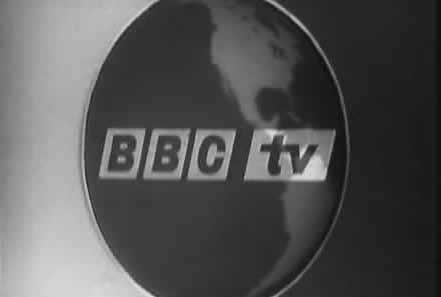
Sally couldn’t remember how the announcer introduced the next programme. She was just too glad that it was coming on at all. The next moment she was captivated by the strange, swirling, whirling images and the music that introduced the first episode of Doctor Who. Then the quiet scene of a policeman with his torch looking around a junk yard....
Twenty-three minutes later she breathed deeply, and it felt as if she was breathing for the first time since the signature music had begun. Then she laughed. Then she burst into tears of joy. She had only one regret, and that was that she had watched it on her own. She wished there was somebody else with her, somebody who hadn’t been watching it being rehearsed and recorded until she knew every word of the script and every step each actor should take. She wanted to see somebody else’s reaction to the inside of the police box, to the Doctor’s explanation about time and space, to the police box arriving in a new place at the end of the episode, ready for a new adventure next week.
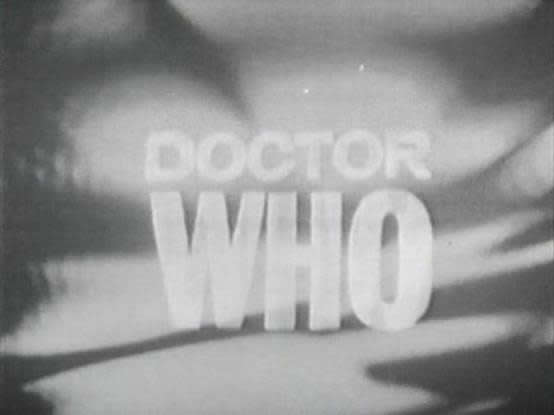
She wondered if her friends had remembered her telling them about it. Had they watched? Did they like it? Did Jennifer Gill think Ian Chesterton was as dishy as Ken Barlow?
Oh, wait until they see the Daleks, she told herself with a secret smile and then she remembered that on Monday morning she would be back in Verity Lambert’s office ready to type memos and write reports and that there were another twenty-five episodes to make and to broadcast.
She was so glad to be a part of something that was far more than just a children’s programme that filled the gap between Grandstand and Juke Box Jury.
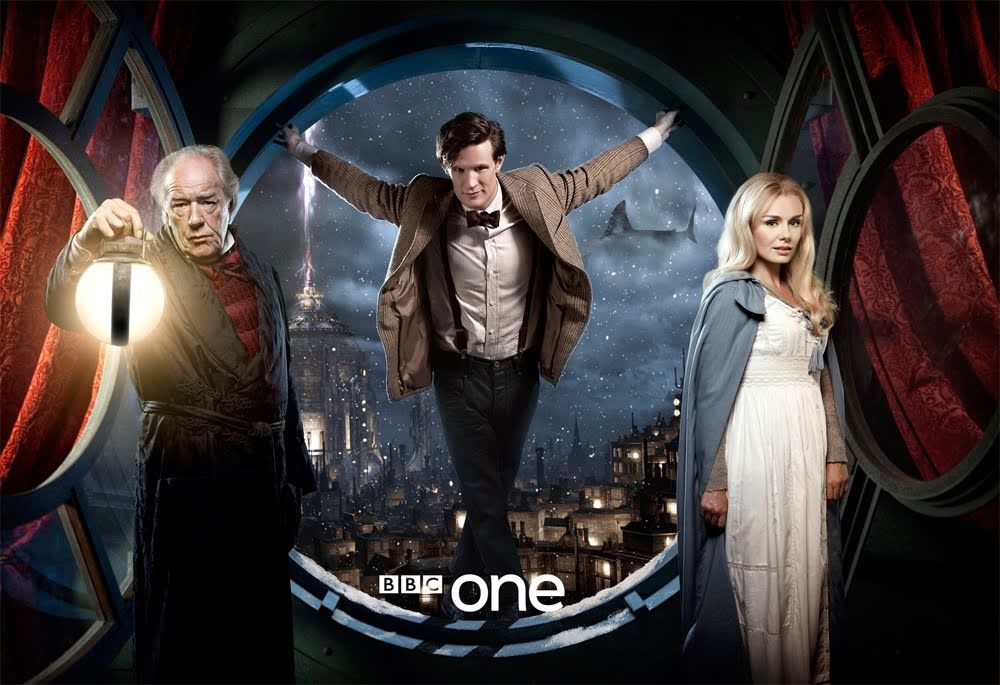
 |